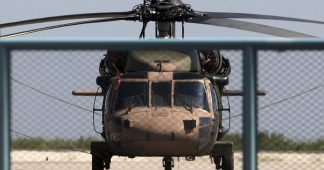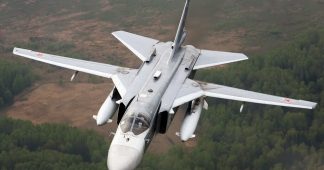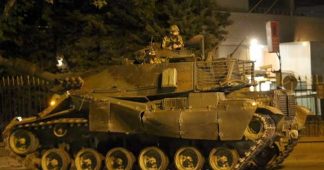By Alex Lantier and Johannes Stern
Relations between Ankara and Washington are deteriorating rapidly following the July 15 coup attempt in Turkey, which the Turkish government believes was supported by the Obama administration. In a series of stunning statements on Friday, delivered from the bombed-out ruins of a police base in Ankara, Turkish President Recep Tayyip Erdogan directly accused the US government of backing the coup.
Erdogan denounced statements by top US military and intelligence officials attending a security conference in Aspen, Colorado who criticized him for launching a purge of the Turkish army in the aftermath of the coup. US Director of National Intelligence James Clapper rebuked Erdogan for arresting Turkish military officers close to Washington. “Many of our interlocutors have been purged or arrested,” he fumed. “There’s no question this is going to set back and make more difficult cooperation with the Turks.”
Gen. Joseph Votel, the chief of the US Central Command, which oversees US military operations in the Middle East, warned that the purge was “something to be very, very concerned about” because it could harm the campaign against the Islamic State (IS) militia in Syria. NATO Supreme Commander General Curtis Scaparrotti declared, “Some of the officers that we have our relationships with in Turkey are now either detained, in some cases retired as a result of the coup. We’ve got some work to do there.”
Erdogan angrily charged Votel with supporting the coup, saying, “The US general stands on the coup plotters’ side with his words. He disclosed himself via his statements… Is it up to you to decide on this? Who are you? Instead of thanking the state for repelling the coup attempt, you stand with the coup plotters.”
Referring to the US-based Turkish Islamist Fethullah Gülen, whom he accuses of organizing the coup, Erdogan said: “The coup plotter is in your country. You are nurturing him there. It’s out in the open.” He added, “My people know who is behind this scheme… they know who the superior intelligence behind it is, and with these statements you are revealing yourselves, you are giving yourselves away.”
The Turkish president attacked US and European ruling circles for expressing concern that escalating arrests of army officers would harm Turkey’s future. He pledged to continue the crackdown in the army. “What are their concerns?” he asked. “They are concerned about the suspensions, detentions, arrests and the like and the increase in them. Are they going to increase? If the people are guilty, they will.”
The statements by both Erdogan and the US officials underscore the drastic deterioration in relations between Washington and Ankara that had already occurred prior to the coup. Far from welcoming Erdogan’s survival, Washington is attacking a government that narrowly survived a coup attempt that claimed over 270 lives and nearly led to Erdogan’s assassination.
The coup has exposed the explosive tensions growing behind the scenes within the NATO alliance, of which Turkey is a member state. The attempted putsch took place against the backdrop of a warming of relations between Turkey and Russia that cuts across US policy in the Middle East, in particular, US plans to undermine Russian influence by orchestrating the overthrow of Moscow’s sole surviving Arab ally, Syrian President Bashar al-Assad.
The Turkish government recklessly shot down a Russian jet involved in fighting US-backed rebels in Syria. In the aftermath of that incident in November of last year, Turkey has become increasingly concerned that the Syrian war is strengthening the position of separatist Kurdish forces. Under those conditions, Ankara intitated a broad shift in its foreign policy this spring. It signaled that it might cease backing the Syrian war, which it had agreed to support shortly after Washington launched it five years ago.
After the ouster of Turkish Prime Minister Ahmet Davutoglu in May, his replacement, Binali Yıldırım, proposed to bring Turkish foreign policy back to the “good old days.” He said he intended to “increase the number of friends and reduce the number of enemies.”
In June, Erdogan sent Moscow a letter calling Russia “a friend and a strategic partner.” The letter stated, according to the Kremlin, “We never had a desire or a deliberate intention to down an aircraft belonging to Russia.”
Coincidentally or otherwise, Davutoglu has made statements indicating that he gave the shoot-down order in November—though he later retracted them—and the pilot who shot down the Russian warplane in November flew a rebel F-16 fighter over Ankara during the failed coup.
On July 13, two days before the coup, Yıldırım even included Syria in the list of countries with which Turkey intended to improve ties. He said, “I am sure that we will return ties with Syria to normal. We need it. We normalized our relations with Israel and Russia. I’m sure we will go back to normal relations with Syria as well.”
Since 2001, US imperialism has laid waste to Afghanistan, Iraq, Libya and Syria in order to install pro-US puppet regimes, crush Russian influence and dominate the Middle East. It takes little imagination to recognize that powerful sections of the American bourgeoisie, which historically backed three successful coups in Turkey (1960, 1971 and 1980), might have at least tolerated last month’s coup attempt in order to cut off developing ties between Russia and Turkey.
The US foreign policy establishment is, moreover, deeply disturbed by the policies Erdogan outlined after the coup, indicating that he was considering an alliance with Russia and Iran. In a telephone call with Iranian President Hassan Rouhani a few days after the coup, Erdogan said that Turkey is now “even more determined to work hand-in-hand with Iran and Russia to resolve regional issues and strengthen our efforts to return peace and stability to the region.” Erdogan is now scheduled to meet Russian President Vladimir Putin in St. Petersburg on August 9.
US officials in Aspen insisted that such alliances were unacceptable to Washington. Clapper accused Moscow of trying to “drive a wedge between Turkey and the West, specifically Turkey and NATO.”
As for Scaparrotti, he declared, “We will watch closely how this relationship develops. I would be concerned if they were departing from the values that are the bedrock of the Washington Treaty [which founded NATO]—the rule of law.”
Under these conditions, US claims that Washington had no advance warning of the coup are simply not credible. Turkey’s Incirlik Air Base, which hosts more than 5,000 American soldiers and is the main base for the US-led bombing campaign against Syria and Iraq, was the organizing center of the putsch. Pro-coup fighter jets flew in and out of Incirlik as the coup unfolded. Shortly after the coup failed, the base commander, General Bekir Ercan Van, was arrested along with other pro-coup soldiers at the base.
Given that Incirlik is the site of dozens of US nuclear weapons, no credibility can be given to claims that US intelligence was unaware that a coup against Erdogan was being organized from there. Were that truly the case, it would represent a CIA intelligence breakdown of stunning proportions.
It is now being reported that Ankara received warning of the coup and Erdogan escaped assassination only because of reports from Russian forces that US-linked assassins were on the way to kill him.
Russian forces at the nearby Khmeimim airbase in Syria reportedly intercepted coded radio signals containing information about preparations for a coup and shared them with the Turkish government. Erdogan left a hotel in Marmaris only minutes before 25 rebel soldiers descended on the hotel and began shooting. Ultimately, hundreds were killed and thousands wounded as rebel army units bombed the Turkish parliament and attacked pro-Erdogan protesters and loyal military and police units.
A pro-coup officer captured by the Turkish government, Lieutenant Colonel Murat Bolat, told the conservative Yeni Savak newspaper that his unit was designated to detain and possibly murder Erdogan after receiving precise information on Erdogan’s location from US sources.
“A person in the meeting, whom I guess was an officer from the Special Forces, said, ‘Nobody will be allowed to rescue the president from our hands,’” he said, indicating that this meant Erdogan was to be shot after he was captured if the forces who had arrested him faced any counterattack.
Yeni Safak also identified US General John F. Campbell as the “man behind the failed coup.” According to the newspaper, the former commander of the Resolute Support Mission and United States Forces in Afghanistan worked with a team of 80 CIA operatives, distributing $2 billion to pro-US and pro-Gülen elements in the Turkish military to prepare the coup.











